
France competed at the 1912 Summer Olympics in Stockholm, Sweden. 119 competitors, 118 men and 1 woman, took part in 66 events in 13 sports.
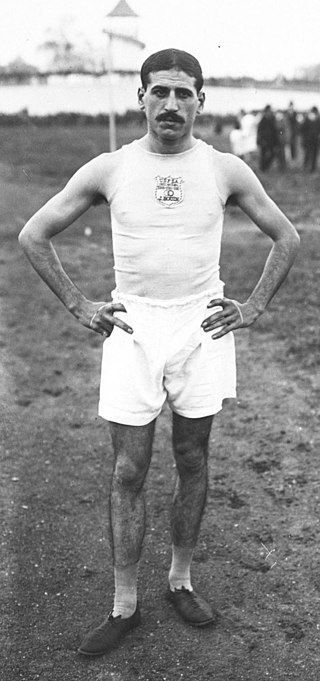
Alexandre François Étienne Jean Bouin was a French middle-distance runner. He competed in the 1500m at the 1908 Olympics and the 5000m at the 1912 Olympics. He won a silver medal in the 5000m in 1912, behind Hannes Kolehmainen. His race against Kolehmainen has long been regarded as one of the most memorable moments in running. Kolehmainen and Bouin quickly pulled away from the others, with Bouin leading and Kolehmainen repeatedly trying to pass him. Kolehmainen succeeded only 20 metres from the finish, winning by 0.1 seconds. Both contenders broke the previous world record.

The men's 100 metres was a track and field athletics event held as part of the Athletics at the 1912 Summer Olympics programme. It was the fifth appearance of the event, which is one of 12 athletics events to have been held at every Summer Olympics. The competition was held on 6 July 1912 and on 7 July 1912. Seventy runners from 22 nations competed. NOCs could enter up to 12 athletes. The event was won by Ralph Craig of the United States, as the Americans swept the medals for a second time.

The men's 200 metres was a track and field athletics event held as part of the Athletics at the 1912 Summer Olympics programme. It was the fourth appearance of the event, which has appeared at every edition of the Summer Olympics since the 1900 Summer Olympics. The competition was held on July 10, 1912, and on July 11, 1912. 61 runners from 19 nations competed. NOCs could enter up to 12 athletes. The event was won by Ralph Craig of the United States, the nation's third victory in four Games. Another American, Donald Lippincott, took silver. Great Britain earned its first medal in the 200 metres with Willie Applegarth's bronze.

The men's 400 metres was a track and field athletics event held as part of the Athletics at the 1912 Summer Olympics programme. The competition was held on Friday, July 12, 1912, and on Saturday, July 13, 1912. Forty-nine runners from 16 nations competed. NOCs could enter up to 12 athletes. The event was won by Charles Reidpath of the United States, the nation's fourth title in the event. Hanns Braun of Germany took silver, the nation's first medal in the men's 400 metres.

The men's 800 metres was a track and field athletics event held as part of the athletics at the 1912 Summer Olympics programme. It was the fifth appearance of the event, which is one of 12 athletics events to have been held at every Summer Olympics. The competition was held from Saturday, July 6, 1912, to Monday, July 8, 1912. Forty-seven runners from 16 nations competed. NOCs could enter up to 12 athletes. The event was won by Ted Meredith of the United States, the nation's third consecutive victory in the 800 metres. Mel Sheppard became the first man to win two medals in the event, coming in second to miss out on defending his 1908 gold. Ira Davenport completed the United States sweep, the second time the Americans had swept the 800 metres podium.

The men's 1500 metres was a track and field athletics event held as part of the athletics at the 1912 Summer Olympics programme. The competition was held on Tuesday, July 9, 1912, and on Wednesday, July 10, 1912. Forty-five runners from 14 nations competed, including the Olympic champion from 1908, Mel Sheppard. NOCs could enter up to 12 athletes.
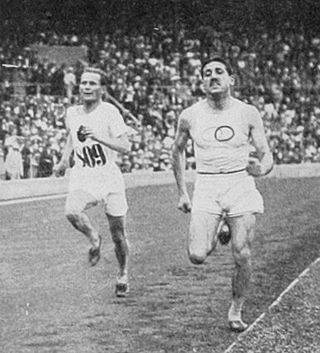
The men's 5000 metres was a track and field athletics event held as part of the Athletics at the 1912 Summer Olympics programme. It was the debut of the event, which along with the 10000 metre event replaced the 5 mile race held at the 1908 Summer Olympics. The competition was held on Tuesday, July 9, 1912, and on Wednesday, July 10, 1912. Thirty-one long-distance runners from eleven nations competed. NOCs could enter up to 12 athletes.

The men's 4 × 100 meters relay was a track and field athletics event held as part of the Athletics at the 1912 Summer Olympics program. It was the debut of the event, which along with the 4 × 400-meter relays marked the first relays of equal legs in the athletics program. The competition was held on Monday, July 8, 1912, and on Tuesday, July 9, 1912. NOCs could enter 1 team of 4 athletes, with up to 2 reserves.
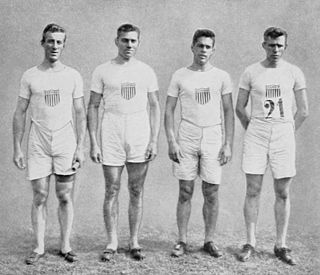
The men's 4 × 400 metres relay was a track and field athletics event held as part of the Athletics at the 1912 Summer Olympics programme. It was the debut of the event, which along with the 4 × 100 metre relay marked the first relays of equal legs in the athletics programme. The competition was held on Sunday, July 14, 1912, and on Monday, July 15, 1912. Twenty-eight runners from seven nations competed. NOCs could enter 1 team of 4 athletes, with up to 2 reserves.

The men's 3000 metres team race was a track and field athletics event held as part of the athletics at the 1912 Summer Olympics programme. It was the fourth appearance of a team race style event, though the first to be held at the distance of 3000 metres, which became the standard until the event was eliminated following the 1924 Summer Olympics. The competition was held on Friday, July 12, 1912, and on Saturday, July 13, 1912.
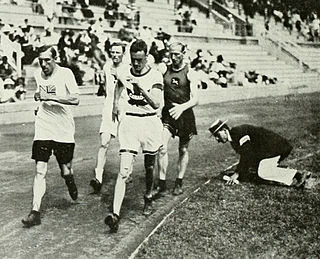
The men's 10 kilometres walk was a track and field athletics event held as part of the Athletics at the 1912 Summer Olympics programme. It was the second appearance of racewalking, which had debuted at the previous games with the 10 mile and 3500 metre walks. The 10 kilometre was the only racewalking event in 1912. The competition was held on Monday, July 8, 1912, and on Thursday, July 11, 1912. Twenty-three racewalkers from twelve nations competed. NOCs could enter up to 12 athletes.

The men's triple jump, also known as the hop, step, and jump, was a track and field athletics event held as part of the Athletics at the 1912 Summer Olympics programme. The competition was held on Monday, July 15, 1912. Twenty athletes from eight nations competed. NOCs could enter up to 12 athletes. The event was won by Gustaf Lindblom of Sweden, the nation's first medal in the men's triple jump. Georg Åberg and Erik Almlöf also medaled for Sweden, completing a sweep—previously accomplished twice by the United States in 1900 and 1904.

The men's high jump, also known as the running high jump to distinguish it from the standing high jump, was a track and field athletics event held as part of the Athletics at the 1912 Summer Olympics programme. It was the fifth appearance of the event, which is one of 12 to have been held at every Summer Olympics. The competition was held on July 7, 1912, and on July 8, 1912. Thirty-seven high jumpers from ten nations competed. NOCs could enter up to 12 athletes. The event was won by Alma Richards of the United States, the nation's fifth consecutive victory in the men's high jump. Germany won its second silver medal in the event, after 1904.

The men's standing long jump was a track and field athletics event held as part of the Athletics at the 1912 Summer Olympics programme. It was the fourth and final appearance of the event. The competition was held on Monday, July 8, 1912. Nineteen long jumpers from eight nations competed. NOCs could enter up to 12 athletes. Ray Ewry, who was the three-time defending champion in the event, did not compete in 1912. The silver medalist from 1908, Konstantinos Tsiklitiras, won the event. Platt Adams, the sixth-place finisher four years earlier, took second. Benjamin Adams finished third. Each of the three standing long jump medalists also medaled in the standing high jump, though in a different order.

The men's hammer throw was a track and field athletics event held as part of the athletics at the 1912 Summer Olympics programme. It was the fourth appearance of the event, which had been won all three previous times by John Flanagan. The competition was held on Sunday, July 14, 1912. Fourteen hammer throwers from four nations competed. NOCs could enter up to 12 athletes. The event was won by Matt McGrath of the United States, the nation's fourth consecutive victory in the event. McGrath was the second man to earn multiple medals in the hammer throw. Duncan Gillis of Canada took silver. Clarence Childs of the United States finished third for bronze.
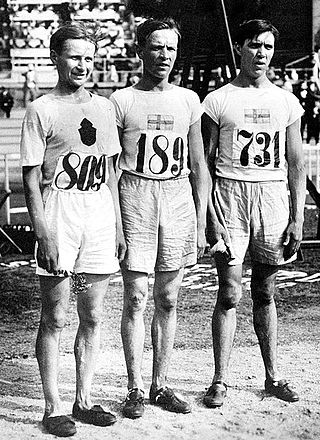
At the 1912 Summer Olympics, the men's individual cross country race was held as part of the athletics programme. It was the first appearance of the event. The competition was held on Monday, July 15, 1912. Forty-five runners from nine nations competed. NOCs could enter up to 12 athletes.
The men's 200 metre breaststroke was a swimming event held as part of the swimming at the 1912 Summer Olympics programme. It was the second appearance of the event, which had been introduced in 1908. Germany swept the medals in the event. The competition was held from Sunday July 7, 1912 to Friday July 12, 1912.
The men's 400 metre breaststroke was a swimming event held as part of the swimming competition at the 1912 Summer Olympics. It was the second appearance of the event, which had been introduced in 1904. The competition was held from Monday July 8, 1912 to Friday July 12, 1912.
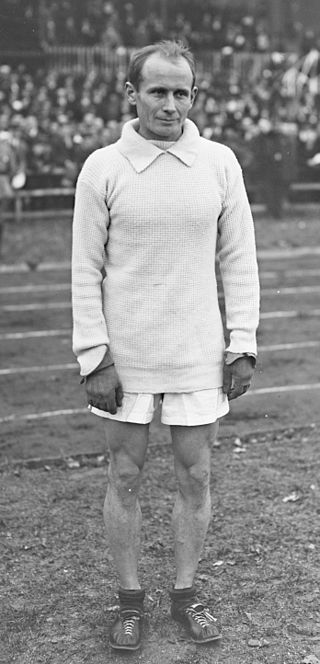
The men's marathon event was part of the track and field athletics programme at the 1920 Summer Olympics. The distance of this race was 42.75 kilometres. The competition was held on Sunday, 22 August 1920. 48 runners from 17 nations competed. No nation had more than 4 runners, suggesting the limit had been reduced from the 12 maximum in force in 1908 and 1912. The event was won by Hannes Kolehmainen of Finland, the nation's first Olympic marathon medal and victory; Kolehmainen received his fourth gold medal, having won the 5000 metres, 10,000 metres, and individual cross country in 1912. Estonia and Italy also won their first marathon medals.


















